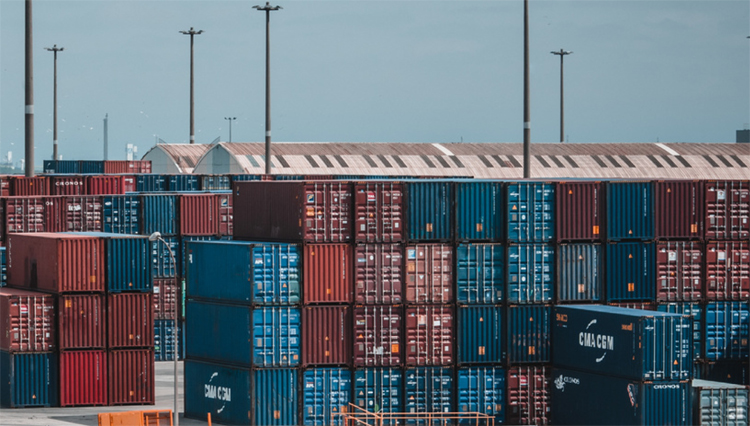November, 5, 2024

Efficient border agency operations are crucial for any economy, especially for island nations like Sri Lanka, where trade significantly contributes to economic growth. Delays in cargo clearance disrupt the flow of goods, increase costs, and undermine the country's competitiveness in global trade. These delays impose substantial economic costs that adversely affect Sri Lanka's GDP, leading to higher operational expenses for businesses and limiting foreign direct investment opportunities. This article will explore the importance of efficient border agency operations in Sri Lanka, provide an overview of the delays in cargo clearance, and examine their broader economic impacts.
The Need for Efficient Border Agency Operations
The economic ramifications are profound; cargo clearance delays result in lost foreign direct investment (FDI) opportunities and diminished GDP growth. Studies indicate that digitizing trade transactions could enhance processing times by 30-40%, significantly improving trade efficiency and bolstering economic output. Furthermore, these delays negatively impact government revenue collection by creating opportunities for misclassifications and under-declarations.
To address these challenges, streamlining cargo clearance procedures through efficient border agency operations are essential. Implementing digitization across the trade activities can facilitate better monitoring of trade and compliance with regulations, ultimately strengthening Sri Lanka’s position in the global marketplace. By modernizing trade infrastructure and enhancing operational efficiency at border agencies, Sri Lanka can unlock its full potential as a competitive player in international trade.
Overview of Cargo Clearance Delays
In recent times, importers, exporters, and most other stakeholders involved in import and export operations, have faced significant challenges due to cargo clearance delays. Containers are often stuck in custom’s examination yards for days or even weeks, primarily due to congestion. This issue gained tragic prominence when a container truck driver, who had reportedly been waiting in line for three days, succumbed to exhaustion and dehydration. Such incidents highlight the severe human and economic toll of these delays.
Reports indicate that at times many hundreds of containers are stuck at ports, obstructing prime commercial land and disrupting port operations. Long queues of container trucks extend for kilometers as they wait to enter customs examination yards located in Colombo's busiest areas. Despite the media coverage and public outcry from affected parties, relevant government officials have largely remained unresponsive. It is disheartening to observe that the agencies involved and responsible for these congestions engage in a blame game on each other rather than addressing the root causes of the problem expediting the clearance processes.
One possible solution is to create a large, automated container examination yard away from busy areas. However, successive governments in Sri Lanka have not taken the necessary steps to implement this or other feasible options. This lack of action has allowed existing container examination yards to continue operating without facilitating trade effectively.
This inefficiency not only exacerbates delays but also creates opportunities for corruption, ultimately inflating consumer prices on imported goods for local consumption while losing export competitiveness on imported inputs for exports.
Cargo clearance delays have become a significant bottleneck at Sri Lanka's Customs examination yards from time to time. These delays stem from several interrelated factors, including bureaucratic inefficiencies and outdated processes. The inadequate infrastructure at customs clearance yards including access roads, exacerbates the situation. Limited space for inspections, insufficient modern scanning equipment, and a reliance on outdated manual inspection processes by relevant border agencies contribute to these substantial delays.
Economic Impact of Delays in Cargo Clearances
The economic repercussions of these delays are widespread, affecting multiple facets of the Sri Lankan economy.
Below are some of the most significant constraints faced by trade.
The Impacts of the challenges mentioned above are as follows;
One of the most immediate effects of cargo clearance delays is the increase in costs for businesses. Goods that remain stuck in the clearance process accrue demurrage fees (charges for storage beyond the allotted free time) and other storage costs. For many businesses, these added expenses eat into their margins, which are often passed on to consumers in the form of higher prices. This has inflationary effects on both local retail goods, impacting the cost of living, as well as on imported items used for manufacturing goods for export, resulting in higher production costs.
Additionally, the longer lead times caused by clearance delays disrupt production schedules, particularly in export-oriented industries. Sri Lanka’s exporters, many of whom operate under tight timelines of international buyers, find themselves at a disadvantage when they cannot deliver goods on time. This not only results in arranging shipments by air, instead of sea incurring a huge cost and financial penalties for the exporter, but also damages exporters’ and Sri Lanka’s reputation in the global market.
Sri Lanka's economy is highly dependent on the smooth functioning of supply chains, particularly for sectors like apparel, agriculture and others, where timely receipt of imported raw materials is essential. When delays in clearing cargo create bottlenecks in these supply chains, it seriously leads to production halts and missed business opportunities.
For example, manufacturers operating under the Board of Investment (BOI) or others, often face production stoppages because imported raw materials are delayed at the examination yards. This disrupts entire supply chains, affecting not only the manufacturers but also downstream industries and consumers. In a globally competitive environment, such inefficiencies erode Sri Lanka’s standing as a reliable production and export base.
Foreign direct investment (FDI) plays a crucial role in the development of Sri Lanka’s economy. However, inefficient border clearance including prolonged delays in cargo clearance, creates a perception of a cumbersome regulatory environment, which can deter potential investors. Companies that rely on efficient supply chains may choose to invest in countries with more streamlined processes, leading to a loss of valuable investment opportunities for Sri Lanka.
Sri Lanka’s economic recovery efforts, particularly in the wake of the COVID-19 pandemic and economic crisis, require attracting FDIs to boost key sectors like manufacturing, logistics, and technology. Prolonged delays in cargo clearance operations could hamper these efforts, making the country less attractive to investors who seek efficiency and predictability.
The efficiency of customs and border management is a key factor considered in global logistics performance rankings, directly influencing investor confidence. In the 2023 World Bank’s Logistics Performance Index (LPI), Sri Lanka ranked 73rd out of 139 countries. This index evaluates factors like customs clearance, infrastructure, and logistics services, all of which are critical for smooth international trade operations. Improving customs clearance efficiency would not only raise Sri Lanka’s LPI ranking but also create a more favorable investment climate.
By addressing these customs & border agencies' inefficiencies, Sri Lanka could significantly improve its attractiveness to FDIs. A better LPI ranking would enhance investor confidence, as smoother trade processes signal a favorable business environment. In turn, this would stimulate economic growth, as increased FDI brings job creation, technological innovation, and infrastructure development. Fixing these issues is critical to unlocking Sri Lanka’s potential as a regional logistics hub and driving future investments.
Due to congestion in the customs examination yards, there could be a ripple effect on Colombo Port, creating congestion as containers pile up and disrupt the smooth flow of goods out of the port. This situation could have adverse effects on the country, preventing it from capitalizing on its geographic advantage. As other countries in the region invest in modernizing their trade infrastructure and improving clearance processes, Sri Lanka must take proactive steps to address these issues in order to remain competitive in the global market and avoid serious consequences.
Delays in cargo clearances significantly impact government revenue, primarily because Sri Lanka Customs is the second largest revenue-collecting agency of the government, responsible for customs duties and taxes on imports and exports. In 2024, Sri Lanka Customs achieved a record revenue collection of over 1 trillion rupees, yet ongoing cargo clearance delays have led to trade resulting in substantial business losses.
Policy Recommendations to Address Cargo Clearance Delays
Cargo clearance delays in Sri Lanka are a significant impediment to economic growth, necessitating urgent reforms to enhance the efficiency of customs and border agency clearance procedures. The following policy recommendations aim to streamline processes, improve inter-agency coordination, and leverage technology for better trade facilitation.
Frequent changes in trade policies create an unstable environment that complicates planning for businesses. When policies are constantly shifting, companies struggle to develop long-term strategies, leading to uncertainty in investments and operations. This unpredictability can deter foreign direct investment, as potential investors may view the environment as risky.
Moreover, frequent policy changes can result in increased compliance costs for businesses. Companies must continually adapt to new regulations, which can divert resources away from core activities and hinder growth. The lack of consistency also makes it challenging for businesses to build relationships with suppliers and customers, further impacting their competitiveness in the global market.
To foster a more stable trade environment, it is essential for policymakers to minimize unnecessary changes and focus on creating clear, consistent regulations. This approach will enable businesses to plan effectively, invest confidently, and contribute positively to the economy.
The establishment of a one-stop shop concept in a new Customs examination yard represents a significant advancement in trade facilitation for Sri Lanka. By centralizing all border agencies in a single location, this initiative streamlines the cargo clearance process, reducing delays and inefficiencies. This integration allows traders to interact with multiple authorities without needing to visit different offices, minimizing redundancy and enhancing operational efficiency. A well-designed examination yard with ample space for handling container cargo will improve inspection capabilities, ensuring quicker processing times. Strategically located close to Colombo Port but away from busy areas, the new yard will help prevent traffic congestion, facilitating smoother logistics operations while alleviating public traffic issues. Overall, this one-stop shop concept not only enhances trade efficiency but also fosters economic growth by creating a more favourable environment for businesses saving cost, positioning Sri Lanka as a competitive player in international trade.
The National Single Window is essential for modernizing cargo clearance. This integrated digital platform allows businesses to submit documentation once, enabling simultaneous access by all relevant government agencies. Despite being in discussion for over 30 years, accelerating the implementation of the NSW could significantly enhance trade efficiency and reduce clearance times. The establishment of this system is aligned with international standards set by the World Trade Organization (WTO), and its successful implementation can serve as a catalyst for broader economic recovery in Sri Lanka.
Read our article on, National Single Window: Game Changer for Sri Lanka’s Trading Community” https://www.chamber.lk/wp-content/uploads/2024/09/National-Single-Window_A-Game-Changer-for-Sri-Lankas-Trading-Community-2.pdf
Establishing an advanced risk management system for cargo clearance, incorporating artificial intelligence (AI), is essential for enhancing trade efficiency and security. This system would analyze vast amounts of data to identify potential risks associated with shipments, allowing customs authorities to prioritize inspections and streamline the clearance process. By leveraging AI, the system can detect patterns and anomalies in trade data, improving the accuracy of risk assessments and reducing the likelihood of delays caused by unnecessary inspections. Furthermore, a sophisticated risk management approach can facilitate quicker decision-making and enhance collaboration among border agencies, ultimately leading to faster cargo movement and increased competitiveness in the global market. This modernization not only boosts operational efficiency but also strengthens compliance and reduces opportunities for fraud, creating a more robust trade environment that eventually benefits the economy.
Investing in capacity building for border agency officials is vital. Regular training programs focusing on technological advancements, trade facilitation techniques, and international best practices will equip officials with the necessary skills to navigate modern trade complexities effectively. Additionally, improving the work environment and fostering a positive attitude among officials can lead to increased productivity and efficiency in cargo clearance operations.
While there have been attempts to introduce solutions, such as the construction of a new container examination yard in Kerawalapitiya, bureaucratic delays have stalled progress. The proposed facility, which could handle up to 3,000 containers, would significantly ease the current congestion at the existing multiple examination yards. Thus, necessary infrastructure development is critical.
Engaging the private sector through public-private partnerships can drive innovation and improve infrastructure related to cargo handling. By incorporating private sector expertise in policy discussions, the government can create a more conducive business environment that addresses the concerns of traders. PPPs can facilitate investments in infrastructure while allowing the government to maintain regulatory oversight, thus optimizing resource allocation and enhancing service quality
Establishing a transparent and accountable system is crucial for reducing delays in cargo clearance. This includes publishing real-time data on clearance times and holding regulatory bodies accountable for inefficiencies. By enhancing transparency, businesses gain better visibility into their goods' status, which minimizes uncertainty and potential delays.
In conclusion, Colombo Port stands as a crucial hub for international trade, strategically positioned along key maritime routes and ranking among the world's leading ports. Its advanced facilities and efficient operations enable quick turnaround times for vessels, while its deep-water capabilities accommodate large container ships, reinforcing its role as a transshipment center for cargo destined for South Asia and beyond. However, to fully leverage these advantages, it is essential to address domestic cargo clearance delays caused by border agencies. Streamlining these processes is vital not only for enhancing trade competitiveness but also for securing Sri Lanka's economic future. By implementing modern solutions such as the National Single Window, digitalizing customs and other border agency operations, and fostering public-private partnerships, Sri Lanka can overcome existing inefficiencies. This will unlock new growth opportunities, bolster its position in leading to export-led growth, and ensure long-term economic prosperity for Sri Lanka.
Writers:

Dinesh de Silva
Senior International Trade Facilitation Expert

Saumya Amarasiriwardane
Economist
The Ceylon Chamber of Commerce
Video Story